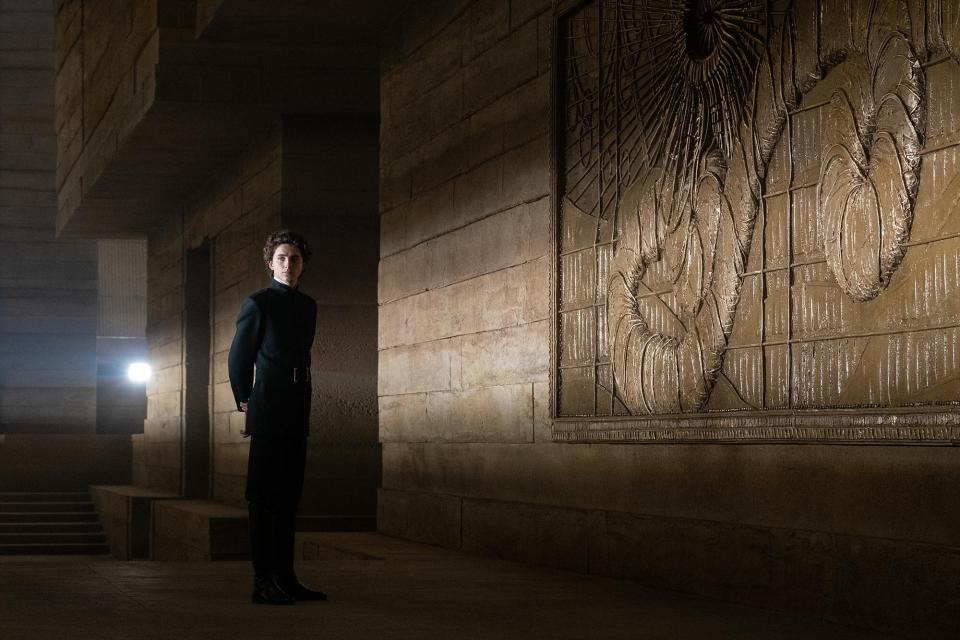A guide to important terms you'll want to know when watching Dune

Dune earned its reputation as one of the foremost sci-fi texts of the 20th century through intricate, imaginative world-building. The universe Frank Herbert established in his original 1965 novel proved rich enough to sustain not only five sequels, but also a plethora of prequels and tie-in books written by the author's son Brian Herbert.
By no means do you have to be acquainted with all these years of canon and backstory to understand the new Dune film. Aside from a minute or two of opening narration, director Denis Villeneuve's adaptation mostly skips on the exposition dumps, preferring instead to bring the viewer into the world with the characters and their environments.
But if you want to make sure you have all your bases covered before watching the movie in theaters or on HBO Max, EW has put together a quick guide to basic Dune concepts. This is not homework by any means, just a glossary for anyone who wants a little extra background to help them enjoy the ride.

Chia Bella James/Warner Bros. Timothée Chalamet as Paul Atreides in 'Dune'
Bene Gesserit: The world of Dune may be ruled over by patriarchal leaders like Duke Leto Atreides (Oscar Isaac), Baron Vladimir Harkonnen (Stellan Skarsgard), and the unseen Emperor, but don't underestimate the women lurking behind the thrones. Members of the all-feminine mystic order known as the Bene Gesserit, such as Lady Jessica (Rebecca Ferguson), are trained to expertly observe and manipulate people's emotions and body language. They are skilled fighters who can easily calculate the most efficient ways to kill an opponent. Through the supernatural power known as the Voice, they can also utter commands that must be obeyed.
Though members of the Bene Gesserit act as advisers to male leaders, the organization is also pursuing its own ends — namely, a centuries-long breeding program designed to produce a messiah figure.
Fremen: The native population of the desert planet Arrakis mostly live outside the feudal system of noble houses. They have enough on their hands just surviving in the sand. Because of the harsh climate, Fremen culture is based around the cultivation and preservation of water. They all wear stillsuits that constantly preserve and recycle fluids like sweat and feed them back to the wearer. When someone dies, their body's remaining water is extracted and given to the tribe as a whole. Giving someone else some of your water (for instance, through spitting at them) is therefore an act of generosity.
Holtzman shields: The medieval vibes of Dune don't just come from the feudal social structure, but also from the way the characters fight with swords and spears. This reversion to an older form of hand-to-hand combat is, ironically, the result of futuristic technology. Personal protective energy fields known as Holtzman shields protect wearers from fast-moving objects such as bullets or lasers. These shields can only be penetrated by slow-moving weapons such as an expertly-wielded blade.
Kwisatz Haderach: Meaning "Shortening of the Way," this is the Bene Gesserit term for the messiah they've been working to create. A man with all the powers of this otherwise-female mystic order would supposedly be able to see through space and time and access powers that no one else could.
The Fremen have their own term for a messiah (perhaps implanted in their culture by Bene Gesserit agents years ago): The "Lisan al Gaib," or "Voice from the Outer World."
Landsraad: Despite all the spaceships, the future of Dune is mostly a feudal one. The governing power of the Imperium is a council of noble houses known as the Landsraad. The greatest of these families, like House Atreides or House Harkonnen, rules over one or more planets, but the Landsraad is where they come together to conduct business with each other and settle disputes. There is strength in numbers; by coming together, these houses can protect themselves from the power of the royal family ruled by the Padishah Emperor. As Dune begins, Duke Leto Atreides is known as one of the most admirable and popular leaders in the Landsraad.

Warner Bros. Pictures The spice melange as seen in 'Dune'
Melange: If Arrakis' environment is so inhospitable, why do powerful families like Atreides and Harkonnen fight so much over it? It's all about the spice melange. This substance, which is integral to the function of the interplanetary system, can only be found in the deserts of the planet called Dune. Melange makes interstellar travel possible, though it's not exactly fuel. You don't feed melange into the tanks of vehicles like oil; instead, melange is taken by the navigators of the Spacing Guild, who use the enhanced mental powers to calculate complex travel routes so spaceships don't all crash into each other.
The spice's psychedelic effects can also enhance the prophetic abilities of someone trained in the ways of the Bene Gesserit, and generally seem to prolong human life. The mark of prolonged spice exposure can be seen in the eyes, which become blue-on-blue. Fremen, who are constantly exposed to spice in their desert environment, all bear these all-blue eyes.
Mentat: Though Dune takes place in the far future, there are no robots or supercomputers to be found. All such artificial intelligence was wiped out years ago in an event known as the Butlerian Jihad (a fun term to know, though it doesn't come up in the new film). As a result, humans have had to make up for certain computer functions through their own ability. Mentats are people specially trained to make high-level mathematical calculations and analyze probabilities.
Most powerful leaders have their own Mentat on hand to aid them in their decision-making. Thufir Hawat (Stephen McKinley Henderson) serves this function for House Atreides, while Piter de Vries (David Dastmalchian) is on hand for House Harkonnen. When in doubt, you can identify a Mentat by the dark marking on their lips.
Sardaukar: Though there are multiple governing structures in place, the Emperor maintains his hold over the galaxy the old-fashioned way: Through overwhelming military power. The elite imperial troops known as Sardaukar are the main reason the great houses feel the need to join together in the Landsraad. On their own, none of these houses would be a match for the might of the Sardaukar, and they know it.
Related content:

 Yahoo Movies
Yahoo Movies 
